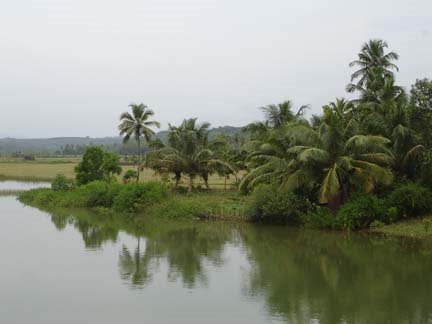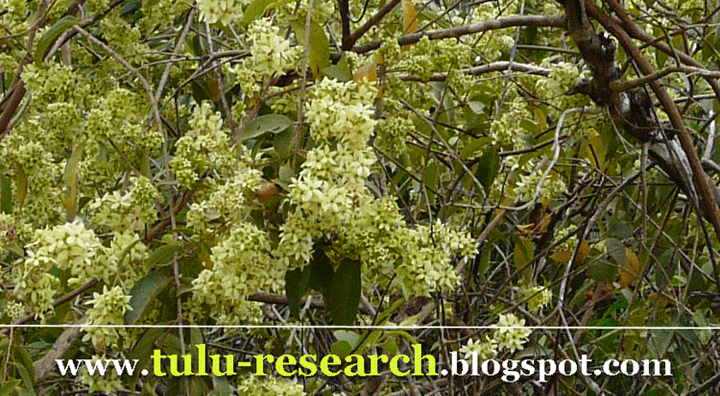The people of Mund(u)kur
Village in Udupi District in the coastal Karnataka are currently in festive
mood as the annual season of Rathotsava (the chariot festival) celebrations connected
with the Village Goddess Durga Parameshwari is scheduled to be culminating on 18th
February 2014. We have discussed several historical aspects of Mundkur (Mundukuru) village in some of the earlier posts in this blog in tidbit fashion (Posts: 5, 216, 219, 305, 309 etc). In this Post we shall discuss some of the Munda village names that are distributed and found in different parts of India such that some strings of historical data that many of us are not explicitly aware of (or do not want to believe because of inherent prejudices) can be appreciated.
The Mundkur Village presently has two alternate names used commonly: (1) Mundkur (Mundukuru) and (2) Munder.
Munder Village
While in Kannada
the Village is usually referred to as Mundukur or Mundkur, (d pronounced as D
in daughter), in Tulu language people call this village as Munder (pronounced as munDeir; with D pronounced as in Daughter). Consequently, there is a tendency to believe
that Munder is a Tulu word for the equivalent Kannada place name of Mundkur (or Mundukuru).
However, it is
quite interesting to note that the term Munder is not an original or exclusive Tulu
word since similar place names are distributed all over India. Now there are
villages called Munder (and also Mundera or Munderi) in Uttar Pradesh, Orissa,
Rajastan and other States of India. Hence it can be deduced that the term
Munder is an antique word borrowed from an earlier language and culture associated
with Munda group of Austro-Asiatic languages which was widespread in various
parts of India.
Thus the presence
of Munder place names spread widely in different parts of India suggests that
the word hails from the antiquity and not a word restricted to users of Tulu language.
It seems that
Munder was the original name of the village since cultural antiquity which was
modified to Mundaka and Mundakur with passage of time and introduction of
Kannada by the rulers.
Mundkur Village
In Kannada usage, the
village is generally known as Mundkur. The word Mundkur or Mundukuru can be
analysed as Mundaka+oor. It seems that the place name Mundukur evolved
in two stages. It could have been Mundaka
to begin with and subsequently the suffix -oor
(or –ur) was attached.
There are several similar
village names ending with suffix -kur
, like: Nandikur, Barakur , Pilikur etc
in Karavali. Probably, these villages were originally known as Mundaka, Nandika, Baraka, Pilika etc (as
in place name Kabaka, etc) to which the suffix –ooru was affixed later along the historical timeline.
Munda, the term
The term Munda basically referred to a hamlet
level leader of tribal people. Several hamlets or a confederation of
habitations had a leader known as Manki among
the Austro-Asiatic tribes living in different parts of India. Somehow the term Munda was extended later to represent
the Austro-Asiatic tribes and the term Manki
was referred to their villages as a place name. The term Munda was adapted into some of the Indian languages and for a
example it means a young man in Punjabi language.
Places having Munda
affixation in the name are quite common in Dakshina Kannada & Udupi
Districts as well as in other parts of Karnataka and India. There are some 801 officially
notified villages with ‘Munda’ as a prefix enlisted in Census of India list for
2011. There may be many more similar sub-villages and hamlets unlisted in the
Census list. Besides, there are also numerous additional villages having the
suffix of ‘Munda’ in their place names (for example, Permunde). It seems some place names like Permunde were modified with passage of time to Permude.
Munda Villages in India
Andaman &
Nicobar Islands:
Munda Pahar
Andhra Pradesh: Mundrai,
Mundladinna, Mundla Pahar, Mundala, Mundur, Mundlapadu, Mundlamuru, Mundla
palle, Mundlavaripalle, Mundlapudi, Munda basti,
Bihar: Mundamla,
Mundiari, Mundipur, Mundaramchhapra, Mundwa, Mundichak, Mundisarae,
Chattisgarh: Mundadih,, Mundagaon,
,Mundadeori,,Mundadadar,
MundaTola, Mundeli, Mundera,
Mundara, Mundapal, Mundagarh, Mundenar, Mundaplli, Munderm, Mundwal,
Gujarat: Mundha, Mundamer, Mundhvay,
Mundra, Mundi,
Haryana:
Mundheta,
Mundarka, Munda Majra, Munda khera, Mundhri, Mundh, Mundi Garhi, Mundlana,
Mundhlian, Mundhal Kalan, MundhalKhurd, Mundakhera, Mundakera, Mundra, Mundia
khera, Mundain, Mundra, Mundawa, Mundi, Mundhalia, Mundiakhera,
Himachal Pradesh: Mundah, Mundla, Mundha, Mundhal,
Mundwin, Mundkher Genda, Mundkher Tulsi, Mund kher, Mundru, Mundi khurd, Mundi
kalan, Mundar, Mundu, Mundli,
Jammu & Kashmir: Mundli Gaon, Mundak Pal,
Mundah, Mund dhar, Mund,
Jharkhand: Mundatanr, Mundradih,
Mundhari, Mundro, Munda, Mundli, Mundih, Mundomala, Mundo, Mundudih, Mundar,
Mundatoli, Mundari, Mundiedal, Mundul, Munduam, Mundadeo, Mundatand, Mundakati,
Karnataka: Mundwad, Mundaganur, Mundargi, Mundki,
Mundaganamane, Mundagesara, Munduvalli, Mundkuru, Mundanahalli, Mundre, Mundagadore,
Mundaghatta, Mundagodu, Mundanahalli, Mundur, Mundaje, Munderga, Mundodi.
Kerala: Munderi, Mundur, Mundathikode,
Mundakayam, Mundothuruth,
Madhya Pradesh: Mundla, Mundrawaja, Mundhari,
Munda, Mundia,Mundli, Mundedi, Mundla Parval, Mundiaram, Mundlakhurd, Mundlakalan,
Mundri, Mundlasondhya, Mundlibhoj, Mundlidotru, Mundlasuleman, Mundat,
Mundpura, Mundla Maina, Mundladev, Mundlana, Mundipur, Mundaheda, Mundana,
Mundis Kalma, Mundla Husain, Mundlabag, Mundla Nayata,
Madhya Pradesh: Mundla Dordar, Mundal
Jotkaran, Mundi, Mundia, Mundia Kheda, Mundiya, Mundla lodha, Mundra, Mundari,
Mundala, Mundrai, Munditola, Mundhol, Mundol, Mundwada, Mundalwad, Mundalgaon.
Maharastra: Mundipar, Mund, Mundhari, Mundikota,
Mundala, Mundhal, Mundra, Mundwadi, Mundagaon, Mundwali, Mundhani, Mundewadi, Mundhe,
Mundhar, Mundka, Mundhela, Mundkati, Mundabele, Mundhwa (near Pune).
Orissa: Mundaghat, Munder, Mundagohira,
Mundala, Mundajohire, Mundatopa, Mundasahi, Mundali, Mundakati, Mundali,
Mundalo, Mundida, Mundabeda, Mundakeri, Mundaguda, Mundikia, Mundagan,
Mundikia, Mundati, Mundabadi, Mundakuri,
Mundadaka, Mundapada, Mundapadua, Mundakani, Mundagaon, Mundar, Mundapadar,
Mundagad, Mundaguda,
Punjab: Mundi Karal, Mundi, Mundkhera,
Rajastan: Mundital, Mundana, Mundpuri Kalan,
Mundraheri, Mundiya, Mundota, Mundwara, Mundoti, Mundeti, Mundata, Mundol,
Mundele, Mundri, Mundli, Mundiya, Munderi, Mundawali, Mundol, Mundwara, Mundle,
Tamilnadu: Mundiyur, Mundachedu,
Mundamalai,
Uttar Pradesh: Mundikheri, Mundet, Mundhol,
Mundi,Mundali, Mundre, Mundhera, Mundia, Mundele, Munder, Mundera, Mund, Mundadeo, Mundala, Munder, Munderwa,
Mundbara, Mundori,
West Bengal: Mundira, Mundamari, Mundakti,
Mundukhola.
Antiquity
of Munda tribes
The widespread distribution of
Munda place names in India suggests that in the antiquity the Munda tribes were
distributed all over India even though
they were marginalized later and presently restricted largely to
under-developed tribal pockets especially in the States of Chattisgarh, Jharkhand, Orissa and Madhya
Pradesh.
The Munda tribes presently remaining in Tulunadu are usually referred to as Mundala tribes. Similar tribes and their languages elsewhere in India are referred to as Mundari in general.
The ancient Munda tribes of Tulunadu have been partially assimilated into the mainstream Tulu/ Dravida tribes during the passage of historical time.
The existence of several Tulu surnames ( bari) such as Munda, Mundavarna, Mundittaya, Mundadittaya etc among various Tulu castes of present day, reveal the past assimilation of Munda tribes into Tulu communities.
It is said that the Spirit Arasu Mundattaya represents the King Veera Pandya, a nephew of Bhutala Pandya according to some legends.
The word Munda in Tulu
In Tulu language, the word Munda has been retained and is being is used in different contexts. In normal usage, the word munda in Tulu means forehead part of (human) body; similarly, mundu has several meanings, such as (a) an unit of measurement (1 mundu=2.5 ft), (b) knee, (c) a sheet of cloth wrapped around waist as an apparel (usually worn by South Indian men), (d) calf (of cattle) (e) short and stout (physical feature) etc. Contrastingly in the neighboring Kannada the munda refers to the body part below head (as in usage runda- munda).
A munda also means a raised platform in coastal areas, for example, used by fishermen to display their fish catches.
Mundappa is a masculine proper name as well as a coastal breed of mangoes.
The Munda tribes presently remaining in Tulunadu are usually referred to as Mundala tribes. Similar tribes and their languages elsewhere in India are referred to as Mundari in general.
The ancient Munda tribes of Tulunadu have been partially assimilated into the mainstream Tulu/ Dravida tribes during the passage of historical time.
The existence of several Tulu surnames ( bari) such as Munda, Mundavarna, Mundittaya, Mundadittaya etc among various Tulu castes of present day, reveal the past assimilation of Munda tribes into Tulu communities.
It is said that the Spirit Arasu Mundattaya represents the King Veera Pandya, a nephew of Bhutala Pandya according to some legends.
The word Munda in Tulu
In Tulu language, the word Munda has been retained and is being is used in different contexts. In normal usage, the word munda in Tulu means forehead part of (human) body; similarly, mundu has several meanings, such as (a) an unit of measurement (1 mundu=2.5 ft), (b) knee, (c) a sheet of cloth wrapped around waist as an apparel (usually worn by South Indian men), (d) calf (of cattle) (e) short and stout (physical feature) etc. Contrastingly in the neighboring Kannada the munda refers to the body part below head (as in usage runda- munda).
A munda also means a raised platform in coastal areas, for example, used by fishermen to display their fish catches.
Mundappa is a masculine proper name as well as a coastal breed of mangoes.
®



